herculean task
从希腊神话看英语词汇的词源理据

从希腊神话看英语词汇的词源理据英语作为一门国际语言,它的词汇汇聚了世界上各种语言的影响。
而希腊神话则是许多英语词汇的源头之一,它为这些单词提供了动人的故事和灵感。
在这篇文章中,我们将从希腊神话的角度来探索一些英语词汇的词源,并了解它们背后的故事。
1. Atlas - 阿特拉斯阿特拉斯是希腊神话中的一位巨人,被罚持天空。
他的名字即来源于希腊语中的 "atlanto",意为 "支撑" 或 "支持"。
在英语中,我们使用"Atlas" 这个词来形容一本地图册,因为阿特拉斯承担了天空和地球的重任,他的名字也被借用来表示一个抗压能力强的人或物。
2. Echo - 回声回声是希腊神话中的一个山林仙女,她和失恋的公牛仙人 Narcissus 的故事成为了 "Echo" 一词的来源。
回声在试图追求 Narcissus 时遭到了拒绝,绝望之下,她只能回应他的话语。
这个故事解释了 "echo" 在英语中指代某个声音的反馈或重复的含义。
3. Nemesis - 報應希腊神话中的 Nemesis 是众神的复仇女神,她会惩罚那些犯下恶行却未受到应有惩罚的人。
"Nemesis" 这个词在英语中被用来指代报应或复仇。
例如,我们常说 "Karma is a nemesis" (因果报应)。
4. Odyssey - 奥德赛奥德赛是希腊神话中的一部史诗,讲述了英勇的 Odysseus 进行冒险和回家的故事。
"Odyssey" 这个词在英语中被用来形容一段冒险旅程或历险经历。
5. Pandora's Box - 潘多拉的盒子潘多拉是希腊神话中的第一个女人,她被训斥因好奇心而打开了放出疾病、灾难和希望之后只剩下希望的盒子。
“Pandora's Box" 这个习语在英语中用来形容一些毁灭性的行为,或表达一种不可逆转的局面。
英语词汇典故及词根
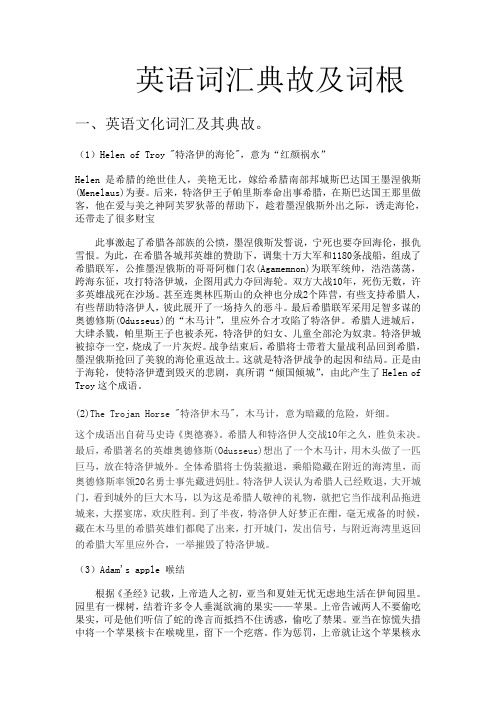
英语词汇典故及词根一、英语文化词汇及其典故。
(1)Helen of Troy "特洛伊的海伦",意为“红颜祸水”Helen是希腊的绝世佳人,美艳无比,嫁给希腊南部邦城斯巴达国王墨涅俄斯(Menelaus)为妻。
后来,特洛伊王子帕里斯奉命出事希腊,在斯巴达国王那里做客,他在爱与美之神阿芙罗狄蒂的帮助下,趁着墨涅俄斯外出之际,诱走海伦,还带走了很多财宝此事激起了希腊各部族的公愤,墨涅俄斯发誓说,宁死也要夺回海伦,报仇雪恨。
为此,在希腊各城邦英雄的赞助下,调集十万大军和1180条战船,组成了希腊联军,公推墨涅俄斯的哥哥阿枷门农(Agamemnon)为联军统帅,浩浩荡荡,跨海东征,攻打特洛伊城,企图用武力夺回海轮。
双方大战10年,死伤无数,许多英雄战死在沙场。
甚至连奥林匹斯山的众神也分成2个阵营,有些支持希腊人,有些帮助特洛伊人,彼此展开了一场持久的恶斗。
最后希腊联军采用足智多谋的奥德修斯(Odusseus)的“木马计”,里应外合才攻陷了特洛伊。
希腊人进城后,大肆杀戮,帕里斯王子也被杀死,特洛伊的妇女、儿童全部沦为奴隶。
特洛伊城被掠夺一空,烧成了一片灰烬。
战争结束后,希腊将士带着大量战利品回到希腊,墨涅俄斯抢回了美貌的海伦重返故土。
这就是特洛伊战争的起因和结局。
正是由于海轮,使特洛伊遭到毁灭的悲剧,真所谓“倾国倾城”,由此产生了Helen of Troy这个成语。
(2)The Trojan Horse "特洛伊木马",木马计,意为暗藏的危险,奸细。
这个成语出自荷马史诗《奥德赛》。
希腊人和特洛伊人交战10年之久,胜负未决。
最后,希腊著名的英雄奥德修斯(Odusseus)想出了一个木马计,用木头做了一匹巨马,放在特洛伊城外。
全体希腊将士伪装撤退,乘船隐藏在附近的海湾里,而奥德修斯率领20名勇士事先藏进妈肚。
特洛伊人误认为希腊人已经败退,大开城门,看到城外的巨大木马,以为这是希腊人敬神的礼物,就把它当作战利品拖进城来,大摆宴席,欢庆胜利。
探索古希腊罗马神话对医学英语术语的影响

探索古希腊罗马神话对医学英语术语的影响【摘要】古希腊罗马神话对医学英语术语有着深远的影响。
神话中的人物、事件、地点等元素都在医学术语中得到体现。
“Achilles heel”这一表达就源自于《伊利亚特》中阿喀琉斯的弱点,用来形容弱点或易受攻击的部分。
包括“Pandora's box”、“Hydra effect”在内的医学术语也源自于神话中的传说。
神话元素的运用丰富了医学领域的术语表达,使得术语更加生动且易于记忆。
古希腊罗马神话对医学英语术语的重要性不可低估,其影响在医学领域中得到了广泛的体现。
神话与医学的结合不仅丰富了专业术语,也增添了故事情节,使得医学知识更加富有趣味性和教育性。
【关键词】古希腊罗马神话,医学英语术语,影响,神话人物,神话事件,神话地点,神话元素,重要性1. 引言1.1 古希腊罗马神话与医学的联系古希腊罗马神话与医学术语的联系可以追溯到古代希腊和罗马文明的起源。
在古希腊和罗马神话中,医学和医疗常被视为神圣的领域,许多医学术语和概念都源自于这些神话故事。
神话中的医神阿斯克勒庇俄斯(Asclepius)和其女儿赫耳墨斯(Hygieia)等神祇被认为是医学的象征,医生们常常向他们祈祷以获取治疗疾病的力量。
古希腊罗马神话中的神话人物、事件、地点以及其他元素都在医学术语中有着深远的影响。
希腊神话中的雅典娜(Athena)被认为是智慧和战争的女神,与医学领域中的智慧、技术和治疗有着密切关联。
医学术语中常出现的神话事件如俄耳甫斯的故事、普罗米修斯的创世传说等也为医学文化提供了丰富的象征意义。
古希腊罗马神话对医学英语术语的影响不仅体现在词汇和名称中,更体现在医学文化中的思想和价值观的传承。
神话故事中的人物形象和事件情节激发了医学的创新和探索精神,使得医学术语在传承古代智慧的也赋予了现代医学更多的文化底蕴和情感内涵。
2. 正文2.1 古希腊罗马神话对医学英语术语的影响古希腊罗马神话在医学领域中有着深远影响,许多医学术语起源于这些古老的神话故事。
herculean task典故
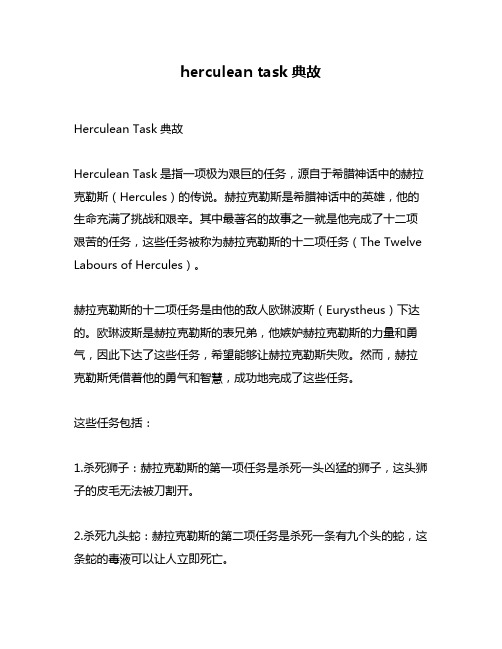
herculean task典故Herculean Task典故Herculean Task是指一项极为艰巨的任务,源自于希腊神话中的赫拉克勒斯(Hercules)的传说。
赫拉克勒斯是希腊神话中的英雄,他的生命充满了挑战和艰辛。
其中最著名的故事之一就是他完成了十二项艰苦的任务,这些任务被称为赫拉克勒斯的十二项任务(The Twelve Labours of Hercules)。
赫拉克勒斯的十二项任务是由他的敌人欧琳波斯(Eurystheus)下达的。
欧琳波斯是赫拉克勒斯的表兄弟,他嫉妒赫拉克勒斯的力量和勇气,因此下达了这些任务,希望能够让赫拉克勒斯失败。
然而,赫拉克勒斯凭借着他的勇气和智慧,成功地完成了这些任务。
这些任务包括:1.杀死狮子:赫拉克勒斯的第一项任务是杀死一头凶猛的狮子,这头狮子的皮毛无法被刀割开。
2.杀死九头蛇:赫拉克勒斯的第二项任务是杀死一条有九个头的蛇,这条蛇的毒液可以让人立即死亡。
3.捕捉野猪:赫拉克勒斯的第三项任务是捕捉一只凶猛的野猪,这只野猪的牙齿和皮肤都非常坚硬。
4.清理马厩:赫拉克勒斯的第四项任务是清理国王的马厩,这些马非常凶猛,无法被驯服。
5.杀死雌性怪鸟:赫拉克勒斯的第五项任务是杀死一只雌性怪鸟,这只怪鸟的翅膀可以产生强大的风力。
6.清理牛棚:赫拉克勒斯的第六项任务是清理国王的牛棚,这些牛非常凶猛,无法被驯服。
7.杀死野狗:赫拉克勒斯的第七项任务是杀死一只凶猛的野狗,这只野狗的牙齿和皮肤都非常坚硬。
8.取得马的饲料:赫拉克勒斯的第八项任务是取得一种神奇的饲料,这种饲料可以让马变得非常强壮。
9.取得金苹果:赫拉克勒斯的第九项任务是取得一颗金苹果,这颗金苹果被守护在一座神庙中。
10.清理马粪:赫拉克勒斯的第十项任务是清理国王的马粪,这些马的粪便非常多,非常臭。
11.取得牛羊:赫拉克勒斯的第十一项任务是取得一群神奇的牛羊,这些牛羊可以让人变得非常富有。
12.取得地狱的三头犬:赫拉克勒斯的最后一项任务是取得地狱的三头犬,这只犬被守护在地狱的门口。
希腊罗马神话:7-8 赫拉克利斯

夫的生命,她甘愿代替他赴死。 赫拉克勒斯为她的精神所感动, 将她从冥界救出。赫拉克勒斯 还搭救了受宙斯惩罚的普洛米 修斯。此外,他还征服了巨人 安泰俄斯。安泰俄斯是大地女 神该亚的儿子。他擅长摔跤, 只要大地母亲一接触,他就力 大无比。他迫使所有经过他地 方的人与他摔跤,如果输给他 就要被处死。在取金苹果的途 中,赫拉克勒斯与安泰俄斯相 遇,赫拉克勒斯几次将他摔倒, 但他每次都从大地母亲身上获 取了新的力量,跳起来再战。 赫拉克勒斯注意到这一点,就 将他举起,在空中扼死了他。
赫拉克勒斯将阿尔普斯河引入牛 圈冲洗,按时完成了任务。 第七项:捕捉克里特公牛。 这头牛本应祭献给海神波塞冬, 但克里特王却把它留下,用另一 头牛代替它。波塞冬十分恼怒, 让这头牛发了疯,在克里特大肆 破坏。赫拉克勒斯把牛扛在肩 上,带回去交给了欧律斯透斯。 第八项:驯服色雷斯国王狄 俄墨得斯的马。狄俄墨得斯用人 肉喂养这些马匹,使它们成为食 人猛兽。赫拉克勒斯杀死狄俄墨 得斯,将其尸体撕碎喂马,马群 顿时失去了野性。
第十项:夺取革律翁的牛群。 这群牛在厄律忒亚岛上放养。 赫拉克勒斯在去厄律忒亚的途 中,在直布罗陀海峡两岸竖起 两块巨石,被后人称为“赫拉 克勒斯之柱”。到达厄律忒亚 岛后,赫拉克勒斯先杀死牧牛 巨人欧律提翁,再杀死三头怪 律提翁,然后将牛群赶会带给 欧律斯透斯。 第十一项:取回赫斯珀里得斯 的金苹果。这些金苹果是赫拉 结婚时大地之母该亚的赠礼, 保存在世界尽头的一座花园里。 结金苹果的那棵树由赫斯珀里 得斯和一条恶龙看守。这项任 务及其困难,因为赫拉克勒斯 不知道金苹果在何处。
第九项:夺取亚马孙女王希波 吕忒的腰带。这条腰带是希波 吕忒的父亲战神阿瑞斯送给她 的,欧律斯透斯的女儿想得到 它,便派赫拉克勒斯去夺取它。 亚马孙人是一群英勇好战的妇 女,她们的习俗是将女婴留下 培养成勇猛的战士,男婴则送 给临近的国家或干脆杀死。赫 拉克勒斯经过一番历险来到亚 马孙国。女王希波吕忒本打算 把腰带交出来,但赫拉使希波 吕忒的女战士们误认为赫拉克 勒斯要绑架女王,向他发起进 攻。赫拉克勒斯以为进攻是女 王发动的,于是将其杀死,带 着腰带逃离亚马孙国。
英语专有名词成语
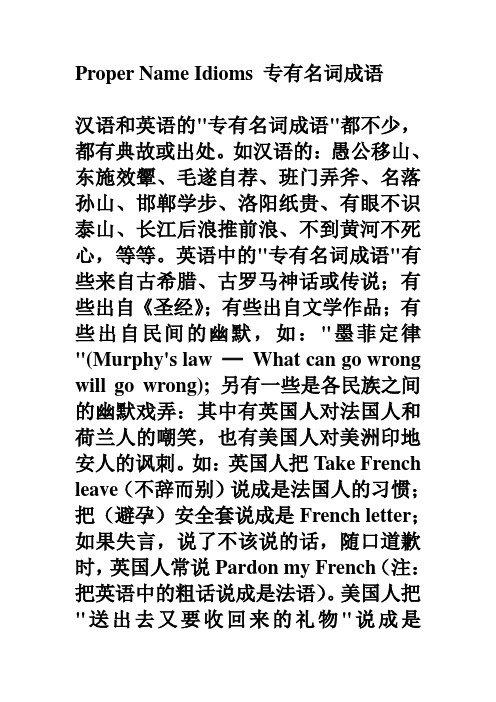
Proper Name Idioms 专有名词成语汉语和英语的"专有名词成语"都不少,都有典故或出处。
如汉语的:愚公移山、东施效颦、毛遂自荐、班门弄斧、名落孙山、邯郸学步、洛阳纸贵、有眼不识泰山、长江后浪推前浪、不到黄河不死心,等等。
英语中的"专有名词成语"有些来自古希腊、古罗马神话或传说;有些出自《圣经》;有些出自文学作品;有些出自民间的幽默,如:"墨菲定律"(Murphy's law ─What can go wrong will go wrong); 另有一些是各民族之间的幽默戏弄:其中有英国人对法国人和荷兰人的嘲笑,也有美国人对美洲印地安人的讽刺。
如:英国人把Take French leave(不辞而别)说成是法国人的习惯;把(避孕)安全套说成是French letter;如果失言,说了不该说的话,随口道歉时,英国人常说Pardon my French(注:把英语中的粗话说成是法语)。
美国人把"送出去又要收回来的礼物"说成是Indian gift(印第安人的礼物)。
本单元的英语成语跟"人名"和"地名"等专有名词有关。
关键词包括:Achilles ― Blarney ― Damocles ― Humphrey ― Dutch ― French ― Freudian ― Garrison ― Gordian ― Greek ― Herculean ― Indian―Jack―Job― John ― Jones ― Newcastle ― Pandora ― Peter ― Penelope ― Pyrrhic ― Reilly ― Roland ― Rome ― Rubicon ― Sally ― Sydney ― Thames ― Waterloo1. Achilles' heel字面意思:阿基琉斯的脚后跟。
汉语俚语 典故 惯用语

社会习俗用语:汉语俚语典故惯用语语言是人类交际的工具,语言的使用是一种社会行为形式,而俚语则是语言的一个实际组成部分,其使用当然也属于社会行为。
俚语虽然不是一个国家或民族全都使用的标准词汇,但也不仅仅局限于某一社会集团或行业群体,其地位似乎介于“口头语”(Colloquialism)与“行话”(Jargon)之间。
俚语的文体功能主要在于立意新颖、诙谐风趣、富有感情色彩。
恰当地使用俚语能够使语言新鲜、活泼、生动、形象,增强语言表现力和想象力。
语(Slang),是指民间非正式、较口语的语句,是百姓在日常生活中总结出来的通俗易懂顺口的具有地方色彩的词语。
地域性强,较生活化。
俚语是一种非正式的语言,通常用在非正式的场合。
有时俚语用以表达新鲜事物,或对旧事物赋以新的说法。
多中外权威词典对俚语都有比较接近的解释,称俚语是“通俗的口语词,俗语的一种,常带有方言性”(中文《辞海》)。
《简明不列颠百科全书》对俚语的诠释为,“主要是一种非习惯用语,用以表达新鲜事物,或对旧事物赋以新的说法”。
国出版的(标准院校词典)对俚语的定义解释为是一种“具有活力、感情色彩、滑稽或忌讳等性质的语言、单词或词组,是在特定场合下所发明和使用,有些则源于标准词汇的非常规使用法”。
俚语在其使用初期被划分为贬义词语。
著名的《韦氏英语词典》在1828年将俚语定义为“低级的、粗俗的和没有意义的语言”;但到了1911年,“低级的”和“粗俗的”字眼却从《牛津英语词典》对俚语的定义中消失了。
1978年出版的《现代汉语词典》对俚语的注释为“粗俗的或通行面极窄的方言词、而在1980年出版的《辞海》中对俚语的定义已取消了”粗俗的这个字眼。
语的文体功能按照语言的文体功能划分,有口头用语和书面用语两大类,各自有正式、非正式用语。
口语正式用语包括演说、讲演、报告、诗歌、朗诵等用语;非正式口语包括日常生活用语、俚语、行话、禁忌语等。
界各地都存在俚语,中文里也有很多俚语如:哇塞、不靠谱、纯爷们儿、囧、雷等等。
毕业后工作遇到的挑战的英语作文
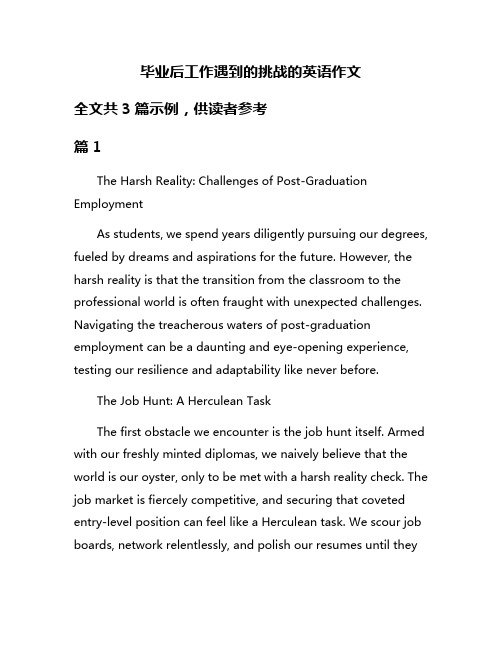
毕业后工作遇到的挑战的英语作文全文共3篇示例,供读者参考篇1The Harsh Reality: Challenges of Post-Graduation EmploymentAs students, we spend years diligently pursuing our degrees, fueled by dreams and aspirations for the future. However, the harsh reality is that the transition from the classroom to the professional world is often fraught with unexpected challenges. Navigating the treacherous waters of post-graduation employment can be a daunting and eye-opening experience, testing our resilience and adaptability like never before.The Job Hunt: A Herculean TaskThe first obstacle we encounter is the job hunt itself. Armed with our freshly minted diplomas, we naively believe that the world is our oyster, only to be met with a harsh reality check. The job market is fiercely competitive, and securing that coveted entry-level position can feel like a Herculean task. We scour job boards, network relentlessly, and polish our resumes until theygleam, but the rejections keep piling up, slowly chipping away at our confidence and self-worth.Imposter Syndrome: The Constant CompanionEven when we do manage to land that elusive job, a new challenge rears its ugly head: imposter syndrome. Suddenly, we find ourselves in a professional environment, surrounded by seasoned veterans who seem to navigate the corporate landscape with effortless grace. We question our abilities, doubting whether we truly belong in this world of suits and briefcases. The fear of being exposed as a fraud haunts us, and we constantly second-guess our every move, paralyzed by the prospect of making a costly mistake.Work-Life Balance: The Elusive PursuitAs if the professional challenges weren't enough, we quickly realize that maintaining a healthy work-life balance is a constant struggle. Gone are the days of leisurely afternoons and late-night study sessions with friends. Instead, we find ourselves consumed by the demands of our jobs, working long hours, and sacrificing our personal lives on the altar of career advancement. The lines between work and leisure become blurred, and we find ourselves teetering precariously on the edge of burnout, desperately seeking respite that seems ever more elusive.Office Politics: A Minefield to NavigatePerhaps one of the most insidious challenges we face is the treacherous world of office politics. We naively thought that our hard work and dedication would be enough to propel us forward, but we soon discover that navigating the intricate web of interpersonal dynamics and power struggles is a crucial aspect of professional success. We find ourselves walking on eggshells, carefully weighing every word and action, lest we inadvertently offend the wrong person or ruffle the feathers of those in positions of authority.Continuous Learning: Keeping Up with the PaceIn today's rapidly evolving professional landscape, the pursuit of knowledge and skill development is a never-ending journey. The degree we worked so hard to obtain is merely the starting point, and we quickly realize that complacency is the enemy of progress. We must constantly strive to upskill and adapt, embracing new technologies, methodologies, and industry trends with a voracious appetite for learning. Failure to do so could render us obsolete, relegated to the sidelines while our more proactive colleagues surge ahead.Perseverance: The Key to Overcoming AdversityAmid these daunting challenges, it is easy to feel overwhelmed and tempted to throw in the towel. However, it is precisely in these trying times that our true mettle is tested. Perseverance becomes our greatest ally, a shield against the onslaught of obstacles that threaten to derail our dreams. We must learn to embrace failure as a valuable teacher, extracting lessons from every setback and using them as fuel to propel us forward. Only by cultivating a resilient mindset and an unwavering determination can we hope to conquer the challenges that come our way.In the end, the transition from student to professional is a rite of passage, a crucible that tests our fortitude and shapes our character. It is a journey fraught with challenges, but one that ultimately prepares us for the trials and tribulations that lie ahead. By embracing these challenges head-on, with a willingness to learn, adapt, and persevere, we can emerge stronger, wiser, and better equipped to navigate theever-changing landscape of the professional world.篇2The Harsh Realities of the Working WorldAs my time at university draws to a close, I can't help but feel a mix of excitement and trepidation about the working world that awaits me. For the last few years, my life has followed a fairly predictable routine – attend classes, complete assignments, study for exams, and enjoy my free time without too manyreal-world responsibilities weighing me down. However, I know that this comforting bubble is about to burst, and I'll soon be thrust into the harsh realities of post-grad life.From speaking to recent graduates and reading experiences online, it's become clear that the transition from student to professional is not an easy one. There are numerous challenges that await, and I fear I may be somewhat ill-prepared to face them head-on. In this essay, I'll outline what I believe will be the biggest hurdles for me after leaving university and how I hope to overcome them.Perhaps the most daunting challenge is the intense competition for entry-level jobs in my field. With a Bachelor's degree alone, I know I'll be joining a vastly oversaturated job market full of other newly-minted graduates all vying for the same roles. Companies can afford to be extremely selective, often requiring not just a degree but extensive experience through internships, co-op placements, and personal projects.As a student, finding time for such experiential learning opportunities was difficult while juggling a full course load. I kick myself now for not making this more of a priority. To stand out from the crowd, I'll need to leverage any relevant experience I do have and really polish my resume, cover letters, and interviewing skills. It may also require a willingness to take on internships or contract work for low or no pay just to get my foot in the door somewhere.Assuming I manage to land an entry-level job in my field, there's no guarantee the work will be particularly engaging or intellectually stimulating at first. From what I've heard, many new grads end up with grunt work like data entry, documentation, basic analysis and research tasks. While obviously not glamorous, I know I'll need to check my ego, embrace humble beginnings, and prove my worth over time through hard work and dedication. It's all about playing the long game and being patient for more exciting opportunities down the road.Then there's the issue of finances to consider. Despite having a steady income for the first time, my starting salary will likely be relatively low, especially in an expensive city. Coupled with student loan payments starting to kick in, I'll need to become very fiscally disciplined in a way I've never had to bebefore. Budgeting, cooking inexpensive meals, potentially taking on roommates – these will all become new realities. The freewheeling days of spending my money however I please on going out, traveling, or indulging new hobbies will likely need to end for a while.Work-life balance (or lack thereof) is another hurdle I've been warned about. Between commuting, extremely long work hours, and workplace stress, it can be easy for one's job to totally consume their life after university. Maintaining a social life, keeping up with old hobbies, or even just getting sufficient sleep and exercise gets exponentially harder. With no more stretches of time off every few months, the risk of burnout also seems alarmingly high. Learning to set boundaries, manage my time, and make self-care a priority will be critical from day one.On a deeper level, I'm bracing myself for what is essentially an identity shift. For my whole adult life so far, I've been defined by being a student. Everything from my friends and daily routines to my goals and mindset has revolved around that identity. Starting full-time work means I'm no longer primarily a student, but rather the vast unknown of a "young professional." This will inevitably come with growing pains and an awkwardtransition period where I don't quite know where I fit in the world anymore.Finally, I have to mention the looming shadow of failure that feels ever-present. What if, despite putting in my best effort, I just cannot hack it in the working world? What if I'm simply not cut out for the field I spent years studying for? The fear of wasting my education and being a disappointment is very real. While I'll do everything in my power to avoid such an outcome, I realize it's a possibility I need to be mentally prepared for as well.Of course, this essay portrays a bit of a worst-case scenario in terms of the challenges. I realize the reality may not be quite so bleak once I navigate those crucial first few months and years in the workforce. There will be excitements, rewards, and accomplishments too that I can't possibly predict right now. New grads do eventually hit their stride, grow into valued employees, and achieve career satisfaction.However, by being realistic about the potential hurdles from the outset, I'm allowing myself to develop the proper mindset. A mix of grit, humility, patience, discipline and adaptability will likely be required to persist through the initial struggles. If I can make it through the growing pains, that light at the end of the tunnel will eventualy start to emerge.While I'm unsure if I'll ever truly feel "ready" in this final stretch before graduation, I know I have no choice but to take the plunge. The training wheels need to come off at some point. By acknowledging and preparing for the challenges that await, I'm hopeful I can set myself up to traverse the rocky initial path as smoothly as possible. Employers love to wax poetic about "resilience" and "grit" in interviews – it's about to be my turn to embody those traits like never before.篇3The Challenges of Working Life After GraduationAs my time at university drew to a close, I felt a mixture of excitement and trepidation about starting my first full-time job. While I was eager to put the skills and knowledge I had gained into practice, I knew that the working world would present a new set of challenges quite different from student life.The first hurdle I encountered was the sheer scale of responsibility that comes with being a full-time employee. Gone were the days when I could stay up late bingeing TV shows and sleep in until noon. Now, I had to be at my desk promptly every morning, ready to take on tasks and projects that had realconsequences for the company. It was a stark contrast to the relatively low-stakes environment of university assignments.Adapting to the corporate culture was another significant challenge. Whereas university fostered a casual, laid-back atmosphere, the workplace demanded a level of professionalism and decorum that took some getting used to. Simple things like how to dress, how to address colleagues and superiors, and how to conduct myself in meetings were all new learning curves. It felt like I was treading carefully, afraid to put a foot wrong and make a bad impression.Time management also proved to be a formidable test. At university, I had the luxury of spacing out assignments and exams over weeks or even months. In the working world, however, deadlines were often much tighter, and I found myself juggling multiple projects simultaneously. Prioritizing tasks and learning to work efficiently under pressure were skills I had to develop quickly.Navigating office politics and interpersonal dynamics was another minefield. In the classroom, relationships were generally straightforward – we were all students working towards a common goal. But in the workplace, there were intricate power dynamics, unspoken rules, and underlying currents ofcompetition and rivalry that I had to navigate tactfully. Building rapport with colleagues and superiors while maintaining boundaries was a delicate balance.Perhaps the most significant challenge, however, was the sheer volume of new information and skills I had to absorb. While university had provided a solid foundation, the real-world applications and nuances of my field were vastly more complex. I often felt overwhelmed and out of my depth, struggling to keep up with the demands of my role. Impostor syndrome was a constant companion, making me question whether I truly belonged in this professional environment.Despite these challenges, I remained determined to succeed.I sought guidance and mentorship from more experienced colleagues, asked questions whenever I was unsure, and embraced a growth mindset. Slowly but surely, I began to find my footing, gaining confidence and competence with each successful project or task completed.Looking back on my first year in the workforce, I can say with certainty that it was one of the steepest learning curves of my life. The challenges were numerous and varied, testing not only my technical skills but also my resilience, adaptability, and emotional intelligence.However, overcoming these obstacles has been immensely rewarding. I have grown both professionally and personally, developing a stronger work ethic, better time management skills, and a deeper understanding of how to navigate the complexities of the working world.While the transition from student to employee was undoubtedly daunting, it has also been an invaluable experience that has prepared me for the next chapter of my career. The challenges I faced have made me a more well-rounded, capable, and resilient individual, ready to tackle whatever obstacles lie ahead.As I reflect on this journey, I realize that the challenges were not obstacles to be feared, but rather opportunities for growth and self-discovery. They pushed me out of my comfort zone, forced me to develop new skills and mindsets, and ultimately shaped me into the person I am today.To my fellow graduates embarking on their own professional paths, I offer this advice: embrace the challenges that come your way. They may seem overwhelming at first, but with determination, an open mind, and a willingness to learn, you will not only overcome them but emerge stronger and more capable on the other side.The working world is a vastly different landscape from the familiar confines of university, but it is also a place of immense potential and growth. Approach it with curiosity, humility, and a hunger for knowledge, and you will find that the challenges, while formidable, are ultimately surmountable – and the rewards of conquering them are well worth the effort.。
herculean task典故的新表述

herculean task典故的新表述标题:Herculean Task: Unveiling the Mythical Origins and Remarkable Significance导语:在这个现代化的世界中,我们常常听到“Herculean task(大力士的任务)”这个短语,通常用来描述一项尤其艰巨或困难的任务。
然而,你是否想过这个短语的典故和它的新表述方式?本文将深入探讨“Herculean task”这一短语的传说之源,并从不同的角度解读其丰富的意义。
无论是历史上的传说,还是当代解读,我们将一同揭示这一旷世典故的新表述。
第一部分:传说的起源1.1 神话与神话中的大力士- 描述希腊神话中的大力士赫拉克勒斯(Hercules),以及他所完成的惊人任务,如十二项劳动。
- 简要介绍赫拉克勒斯作为希腊神话中的英雄所扮演的角色。
- 探讨为什么“Herculean task”这个短语被用来描述超出常人能力范围的任务。
1.2 赫拉克勒斯的十二项劳动- 详细介绍赫拉克勒斯所面临的十二项劳动的困难性和重要性,如击败涅恩狮、清理奥格瑞亚斯的圣牲、清洗阿尔科搪纺斯的牛棚等。
- 分析十二项劳动对赫拉克勒斯人物形象和古希腊文化的影响。
第二部分:现代表述2.1 意义扩展:从神话到现实- 解读“Herculean task”这一短语在现代背景下的广义含义,如某项巨大工作的完成、克服巨大挑战、面对压力的勇气等。
- 阐述这些意义的出现和演变,为读者带来对“Herculean task”短语更全面的理解。
2.2 艺术与文学中的Herculean task- 探讨在文学作品和艺术创作中,“Herculean task”这一短语如何被运用和解读。
- 引用多个现代文学作品和电影中的例子,比如歌德的《浮士德》、雨果的《悲惨世界》以及电影《肖申克的救赎》,来展示短语在不同媒介中的广泛应用。
第三部分:个人观点与总结3.1 我对Herculean task的理解与观点- 分享我对“Herculean task”的理解和解读。
上外英专英语教程2unit6单词总结

1.task [tɑ:sk] vt. 任务 n. 工作,作业;任务;(尤指语言教学中旨在帮助达到某一 学习目的的)活动 Collocation: take sb to task (for\over sth)严厉的责备;训斥 task sb(with sth)交给 某人任务 main task 主任务 task force 特遣部队;特别小组 task group n. [军]特遣部队;工作组 task management 任务管理 task manager [计]任务管理器 task performance 任务绩效;工作效能 uphill task 艰难的工作,艰巨的任务 task bar 工作列 herculean task 艰巨的任务;花巨大气力的工作 visual task 视工作岗位;视觉作 n. 工作,作业;任务 synonym:job, work, role, pursuit, labor vt. 任务 synonym: tax 词根:task tasker n.1. 任务;工作;职责2. 作业,功课3. 艰苦的事情,困难的工 作,苦差事4. [废语]税款5. 【计算机】(操作)任务 vt.1. 派给…任务;给…工作做: taskless a. 任务的 2.tattered ['tætəd] adj. 破烂的,衣衫褴褛的 v. 变破烂(tatter的过去分词) Collocation: tattered life玩家生活 tattered destroy窄身牛仔裤 tattered boxes破烂箱子 tattered flag破旧不堪旗帜图片 picks tattered捡破烂 adj. 破烂的,衣衫褴褛的 synonym:shabby,duddy, raggeatterdemalion 不体面的;衣衫褴褛 n. tatter 碎布;碎纸 tatterdemalion 衣服褴褛的人 vi.tatter 变得破烂 vt.tatter 扯碎;撕碎;使破烂 tatters n 破烂的衣服 in tatters 破烂不堪;破败的 3.tuck [tʌk] vt. 把...藏入;收藏;把,...塞进狭窄的空间;vi.塞进,折叠,卷起 n. 食物;船尾突出部;缝摺;减肥手术;零食 Collocation:tuck in 紧缩;塞入;尽情地吃 be tucked away 坐落于;收藏好;大吃 tuck sb in\up 把....被子掖好 pin tuck 针裥;排褶 Nip Tuck整容室 tuck up折起;收腰型 tuck position团身姿势;集圈位置 miss tuck花针 vi.塞进,折叠,卷起 synonym:curl up, roll up n.食物;船尾突出部;缝摺;减肥手术;零食 synonym:food, energy, diet, vitality, eating vt.缝褶裥;缩拢;舒服地裹在里面;大口吃 synonym:pucker 词根:tuck n. tucker 食物;领布;打褶装置;打横褶的人 vt. tucker 使…疲倦;使…衰弱 untuck v.分开,拆开 untucked a. 4.turmoil ['tə:mɔil] n. 混乱,骚动 Collocation:financial turmoil 金融风暴;金融危机;金融混乱 regional turmoil地区动 乱 market Turmoil市场混乱 Internal Turmoil内乱 sudden turmoil霍乱 emotional turmoil感情波动 n.混乱,骚动 synonym:combustion, disorder, chaos, confusion, involvement
英语词汇中的希腊神话故事

英语词汇中的希腊神话故事英语词汇中的希腊神话故事有很多,以下是一些例子:1. Achilles' heel (阿喀琉斯之踵)- 根据希腊神话,阿喀琉斯是希腊军队中一位勇猛的战士,但他的脚跟是唯一的弱点。
他在特洛伊战争中被一支箭射中脚跟,最终身亡。
2. Pandora's box (潘多拉的盒子)- 根据希腊神话,潘多拉是世界上第一个女人,由宙斯创造。
她被赋予了一只盒子,被告知不要打开。
但是,她不能抵制好奇心,打开了盒子,释放了疾病、灾难和邪恶。
3. Trojan horse (特洛伊木马)- 根据希腊神话,特洛伊战争中,希腊军队虚张声势离开,但留下了一座巨大的木马。
特洛伊人把马带入城中,不知道希腊士兵藏在木马里。
夜晚,希腊士兵从木马中出来,攻陷了特洛伊城。
4. Narcissus (自恋者那西修斯)- 根据希腊神话,那西修斯是一个非常美丽的青年,但他狂恋自己的美貌。
他看到自己的倒影后,深深地爱上了自己,不愿离开倒影,最终变成了一朵水仙花。
5. Odyssey (奥德赛)- 在希腊神话中,奥德赛是特洛伊战争后,奥德修斯回家的故事。
他经历了许多冒险和困难,包括与各种怪物和海神的战斗,最终成功回到故乡。
6. Herculean task (海格力斯的工作)- 根据希腊神话,海格力斯是一位非常强壮的英雄,被迫完成了十二项艰巨的任务。
这个词被用来形容特别困难或庞大的工作。
7. Phoenix rising from the ashes (凤凰涅槃)- 根据希腊神话,凤凰是一种传说中的鸟,可以自己焚身后再生。
这个词在英语中被用来形容一个人或事物经历失败或毁灭后,得以重建或再次崛起。
这只是一小部分希腊神话故事在英语词汇中的应用。
希腊神话故事在西方文化中有着深远的影响,其中许多故事被用作象征和比喻。
herculean task典故

herculean task典故1. 引言在人们的日常生活中,我们经常面临各种各样的任务和挑战。
有时,某些任务可能非常艰巨,需要耗费大量的时间、精力和资源来完成。
这类任务被称为”herculean task”(艰巨的任务)典故。
本文将详细探讨这一典故的来历、意义以及与现实生活中的应用。
2. 希腊神话中的Heracles(赫拉克勒斯)2.1 Heracles的传说Heracles,又称赫拉克勒斯,是希腊神话中的英雄人物。
他是宙斯与凡人女子Alcmene之子,极为强大而且非常勇敢。
Heracles在整个希腊神话中扮演了重要的角色,他的英勇事迹常常被赞美和传颂。
2.2 Heracles的十二项任务据传,在Heracles的一生中,他接受了十二项任务,这些任务被他的堂兄Eurystheus吩咐完成。
这些任务中的大多数都涉及对怪物的斗争、获取珍贵物品或解决一些危机。
这些任务都非常困难而且危险,所以被人们所称为”herculean task”典故。
3. herculean task的意义和应用3.1 难以完成的任务“herculean task”指的是一项非常艰巨和具有挑战性的任务。
这种任务通常需要人们付出更多的努力、时间和智慧,才能成功完成。
正因为这些任务是如此困难,成功完成它们也就成为了一种值得称赞和赞美的壮举。
3.2 几个例子下面列举几个实际生活中的例子,可以帮助我们更好地理解”herculean task”典故的意义和应用。
3.2.1 探索未知领域当科学家们尝试探索未知领域时,他们通常会面临许多困难和挑战。
例如,对海底深渊的探索、对遥远星系的研究等等,这些任务都可以被视为herculean tasks,因为他们需要跨越现有知识的边界,面对未知和未知的挑战。
3.2.2 大规模项目的管理在商业世界中,大规模项目的管理也往往是一项艰巨的任务。
这类项目通常涉及许多关键阶段和复杂的组织协调。
例如,建设大型基础设施、组织奥运会等等,这些都需要大量的资源和时间,以及解决各种技术和管理难题。
希腊神话典故在英语中的妙用参考资料

希腊神话典故在英语中的妙用1.Thanks to her agent,a veritable Pygmalion,she was transformed from an ugly duckling into a Hollywood beauty.皮格马利翁(Pygmalion)是塞浦路斯国(Cyprus)国王,也是一位雕刻家。
他爱上了自己所雕塑的少女像(Galatea),爱与美的女神阿佛洛狄特(Aphrodite)见其感情真挚,赋予雕像以生命,使两人结为夫妻。
Pygmalion现在喻指“对他人或物抱有积极主动、热切期盼态度的人”。
例句中Pygmalion正是取了该意。
2.The present school curriculum seems to some students a procrustean bed.句中的procrustean是形容词,由专有名词派生而来。
procrustes 是古希腊阿提卡(Attica)一带的巨人,译为柏鲁克洛斯德。
他拦路抢劫,把受害人绑在床榻之上。
如果受害人身高超过床榻,柏鲁克洛斯德就截断其下肢;如果受害人身高短于床榻,他就抻长其下肢,使其与床榻齐长。
procrustean 现在喻指“强求一致的;削足适履的”;procrustean bed喻指“强求一致的制度或政策”。
例句中procrustean bed正是取了该意。
3.The Argus-eyed examiner certainly contributed to the honesty of the candidates.Argus是希腊神话中的百眼巨人,译为阿耳戈斯。
他受命护卫宙斯(Zeus)所钟爱的少女——艾奥(Io),后被众神的使者赫耳墨斯(Hermes)所杀。
他的眼睛被放在了孔雀的尾巴上。
Argus 现在喻指“机警之人”;Argus-eyed 喻指“机警的;目光锐利的”。
例句中Argus-eyed 正是取了该意。
英语词汇典故及词根
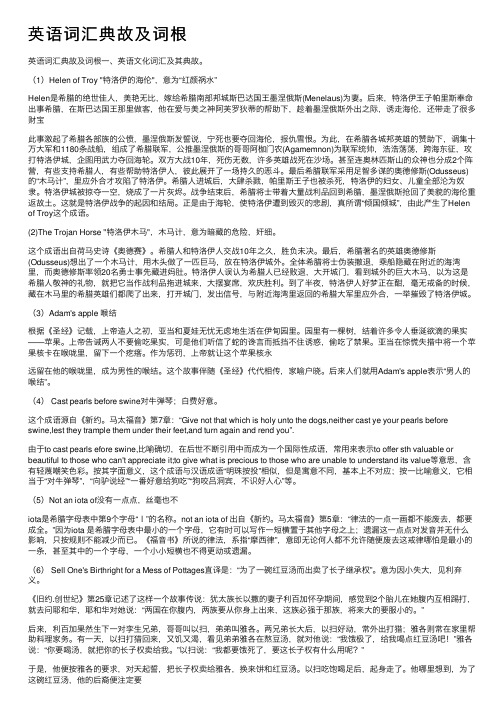
英语词汇典故及词根英语词汇典故及词根⼀、英语⽂化词汇及其典故。
(1)Helen of Troy "特洛伊的海伦",意为“红颜祸⽔”Helen是希腊的绝世佳⼈,美艳⽆⽐,嫁给希腊南部邦城斯巴达国王墨涅俄斯(Menelaus)为妻。
后来,特洛伊王⼦帕⾥斯奉命出事希腊,在斯巴达国王那⾥做客,他在爱与美之神阿芙罗狄蒂的帮助下,趁着墨涅俄斯外出之际,诱⾛海伦,还带⾛了很多财宝此事激起了希腊各部族的公愤,墨涅俄斯发誓说,宁死也要夺回海伦,报仇雪恨。
为此,在希腊各城邦英雄的赞助下,调集⼗万⼤军和1180条战船,组成了希腊联军,公推墨涅俄斯的哥哥阿枷门农(Agamemnon)为联军统帅,浩浩荡荡,跨海东征,攻打特洛伊城,企图⽤武⼒夺回海轮。
双⽅⼤战10年,死伤⽆数,许多英雄战死在沙场。
甚⾄连奥林匹斯⼭的众神也分成2个阵营,有些⽀持希腊⼈,有些帮助特洛伊⼈,彼此展开了⼀场持久的恶⽃。
最后希腊联军采⽤⾜智多谋的奥德修斯(Odusseus)的“⽊马计”,⾥应外合才攻陷了特洛伊。
希腊⼈进城后,⼤肆杀戮,帕⾥斯王⼦也被杀死,特洛伊的妇⼥、⼉童全部沦为奴⾪。
特洛伊城被掠夺⼀空,烧成了⼀⽚灰烬。
战争结束后,希腊将⼠带着⼤量战利品回到希腊,墨涅俄斯抢回了美貌的海伦重返故⼟。
这就是特洛伊战争的起因和结局。
正是由于海轮,使特洛伊遭到毁灭的悲剧,真所谓“倾国倾城”,由此产⽣了Helen of Troy这个成语。
(2)The Trojan Horse "特洛伊⽊马",⽊马计,意为暗藏的危险,奸细。
这个成语出⾃荷马史诗《奥德赛》。
希腊⼈和特洛伊⼈交战10年之久,胜负未决。
最后,希腊著名的英雄奥德修斯(Odusseus)想出了⼀个⽊马计,⽤⽊头做了⼀匹巨马,放在特洛伊城外。
全体希腊将⼠伪装撤退,乘船隐藏在附近的海湾⾥,⽽奥德修斯率领20名勇⼠事先藏进妈肚。
特洛伊⼈误认为希腊⼈已经败退,⼤开城门,看到城外的巨⼤⽊马,以为这是希腊⼈敬神的礼物,就把它当作战利品拖进城来,⼤摆宴席,欢庆胜利。
古罗马神话与英语词汇

古罗马神话与英语词汇古罗马神话是古罗马帝国时期的传统信仰体系,它与古希腊神话有许多共同的神明和故事情节。
古罗马神话中的神明被认为是掌管天地万物的力量,与人类的生活息息相关。
在现代英语中,许多词汇和短语实际上源自古罗马神话和其相关的文化和历史。
下面将详细介绍一些古罗马神话与英语词汇之间的关系。
1. Jupiter - 朱庇特在古罗马神话中,朱庇特是宇宙之神,也是众神之王。
他的名字在英语中派生出“jovial”(欢乐的)和“juvenile”(少年的)这两个词汇。
2. Mars - 火星火星在古罗马神话中是战争与冲突之神。
英语中的“martial”(军事的)一词就源自于火星。
3. Venus - 金星金星是古罗马神话中的爱与美之女神。
英语中的“venereal”(性病的)一词就来自于金星。
4. Mercurius - 水星水星在古罗马神话中是商业与交流之神。
英语中的“mercury”(水银)这个词就来自于水星。
5. Apollo - 阿波罗阿波罗是古罗马神话中的光明与艺术之神。
英语中的“apology”(道歉)一词实际上源自于阿波罗,因为古希腊戏剧中通常会有一段由角色向神明道歉的部分。
6. Neptune - 海王星海王星在古罗马神话中是掌管海洋与海洋生物的神明。
英语中的“neptune”(海王星)一词就来自于古罗马神话中的海神。
7. Pluto - 冥王星冥王星是古罗马神话中的地下王,他统治着地狱。
英语中的“pluto”(冥王星)一词来自于这位神明。
8. Janus - 雅努斯雅努斯是古罗马神话中的两面神,他是开端与结束之神。
英语中的“janitor”(门卫)一词来自于雅努斯,因为门卫在古罗马时代负责打开和关闭大门。
9. Saturn - 土星土星在古罗马神话中是农业和丰收之神。
英语中的“Saturday”(星期六)一词实际上是以土星命名的,因为古罗马人把星期六作为土星的日子。
10. Cupid - 丘比特丘比特是古罗马神话中的爱神,他常常以弓箭射中人们的心脏,使他们陷入爱情。
herculean task典故的新表述

herculean task典故的新表述标题:Herculean Task:探索一个古老典故的新表述引言:在古希腊神话中,赫拉克勒斯(Hercules)是众神之王宙斯和一位人类女子所生的儿子。
他以他无与伦比的力量和勇气而闻名于世,并执行各种难以想象的任务。
其中,最著名的便是被称为"Herculean task"的挑战,这个表达方式现已被广泛用来形容任何艰巨且困难的任务。
本文将对这个典故进行深度分析和新表述,旨在帮助我们在如何面对艰巨任务时有更加全面的理解。
主体:一、典故背景与起源赫拉克勒斯是古希腊神话中最英勇的英雄之一。
他的赫拉克勒斯十二项伟业被认为是最具挑战性和艰难的,因此成为了"Herculean tasks"这个短语的起源。
这些伟业包括与凶猛的怪兽作战、找回失窃宝藏以及执行许多令人难以想象的使命。
二、探索艰巨任务的特点在深入了解典故之前,我们需要理解"Herculean tasks"的特点。
这些任务通常被描述为巨大的、非凡的和难以完成的。
它们要求超越常人的力量、毅力和智慧。
典故中的任务常常体现了面对困难的必然性和人类努力的重要性。
三、实际应用:现代生活中的艰巨任务视角转向现实生活,我们可以发现许多与古代典故相似的艰巨任务。
这些任务可能出现在工作中、个人生活中,甚至是社会责任中。
例如,解决全球气候变化、战胜经济困境以及跨越文化差异等,都可以被视为现代版本的"Herculean tasks"。
文章将通过列举几个实际案例,来讨论这些任务的挑战性和解决方法。
四、面对艰巨任务的方法论解决艰巨任务并不容易,但有一些方法可以帮助我们应对。
既然典故强调了赫拉克勒斯个人优势的重要性,我们也可以从中学习。
这包括制定明确的目标,培养耐心和毅力,通过智慧和创新来应对难题,并寻找支持与合作的机会。
这一部分将提供实用的建议,以帮助我们在面对艰巨任务时做出明智的决策。
选修3 Unit4 What is life 单词详解

10
Unit 4 18.*prologue /ˈprəʊlɒɡ/n.序言,序幕,开场白(45) 【原句】In the prologue to his autobiography, entitled "What I Have Lived For”Russell identifies the three passions that have governed his life: the longing for love the search for knowledge and pity for the suffering of mankind. 在他的自传《我为之而生》的序言中,罗素指出了支配他一生的三种激情:对 爱的渴望、对知识的追求和对人类苦难的同情。 epilogue n.后记,尾声;跋;收场白
【原句】...the longing for love, the search for knowledge, and unbearable pity for the
suffering of mankind. 对爱的渴望,对知识的追求,以及对人类苦难的难以忍受的同情。
She has a great longing for home.她非常想家。 He gazed at her, his eyes full of longing.他凝视着她,眼里充满着渴望。 long v.(看似不可能很快发生的事)渴望,盼望
上课注意不集中有什么办法英语作文

上课注意不集中有什么办法英语作文Title: Strategies to Combat Inattention in ClassIn the hustle and bustle of classroom life, maintaining focus can sometimes prove to be a herculean task.Students often find their minds wandering, which can hinder the learning process.To address this issue, here are a few tactics that might help in improving concentration.标题:应对课堂上注意力不集中的策略在课堂生活的喧嚣中,保持注意力集中有时可能是一项艰巨的任务。
学生们常常发现自己的思绪飘忽不定,这可能会阻碍学习过程。
为了解决这个问题,以下是一些可能有助于提高注意力的方法。
Firstly, sitting at the front of the classroom can significantly reduce distractions.Being in close proximity to the teacher fosters a sense of engagement and makes it easier to pay attention.Secondly, taking notes during lectures can keep the mind active and focused on the subject matter.首先,坐在教室前排可以显著减少分心。
靠近老师能促进参与感,使注意力更易集中。
其次,在讲座时做笔记能让思维保持活跃,专注于课程内容。
Moreover, it"s advisable to establish a study schedule that includes regular breaks.This not only prevents mental fatigue but also enhances concentration.Additionally, managing time effectively and completing assignments on time can alleviate stress, which in turn helps in focusingbetter during classes.此外,建议制定一个包含定期休息的学习计划。
英语限时训练(一)
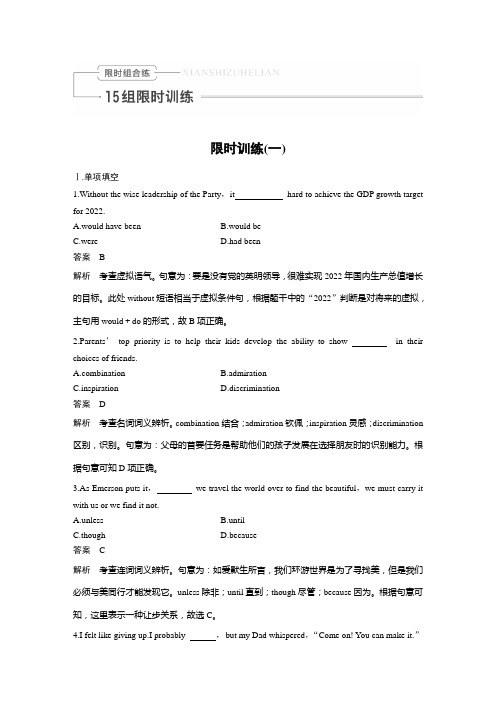
限时训练(一)Ⅰ.单项填空1.Without the wise leadership of the Party,it hard to achieve the GDP growth target for 2022.A.would have beenB.would beC.wereD.had been答案 B解析考查虚拟语气。
句意为:要是没有党的英明领导,很难实现2022年国内生产总值增长的目标。
此处without短语相当于虚拟条件句,根据题干中的“2022”判断是对将来的虚拟,主句用would+do的形式,故B项正确。
2.Parents’top priority is to help their kids develop the ability to show in their choices of friends.binationB.admirationC.inspirationD.discrimination答案 D解析考查名词词义辨析。
combination结合;admiration钦佩;inspiration灵感;discrimination 区别,识别。
句意为:父母的首要任务是帮助他们的孩子发展在选择朋友时的识别能力。
根据句意可知D项正确。
3.As Emerson puts it,we travel the world over to find the beautiful,we must carry it with us or we find it not.A.unlessB.untilC.thoughD.because答案 C解析考查连词词义辨析。
句意为:如爱默生所言,我们环游世界是为了寻找美,但是我们必须与美同行才能发现它。
unless除非;until直到;though尽管;because因为。
根据句意可知,这里表示一种让步关系,故选C。
4.I felt like giving up.I probably ,but my Dad whispered,“Come on! You can make it.”A.would haveB.wouldC.shouldD.should have答案 A解析考查过去将来时。
- 1、下载文档前请自行甄别文档内容的完整性,平台不提供额外的编辑、内容补充、找答案等附加服务。
- 2、"仅部分预览"的文档,不可在线预览部分如存在完整性等问题,可反馈申请退款(可完整预览的文档不适用该条件!)。
- 3、如文档侵犯您的权益,请联系客服反馈,我们会尽快为您处理(人工客服工作时间:9:00-18:30)。
capturing the golden-horned hind of Ceryneia, which was sacred to Artemis;
capturing the Erymanthian boar;
cleaning the stables of Augeas;
routing the Stymphalian birds, which had iron feathers and were sacred to Ares;
Among Greek and Roman philosophers, particularly the Stoics, Hercules was considered a hero-saint, the epitome of one who chose virtue over pleasure and endured a hard life on earth to enjoy immortality with the gods. Euripides (Heracles), Sophocles (The Women of Trachis), and Seneca (Hercules Furens and Hercules Oetaeus) wrote plays about Hercules.
killing the Nemean lion, which could not be killed by metal or stone; from the lion he made the cloak and club that became his trademarks;
killing the multiheaded Hydra of Lerna, which could gபைடு நூலகம்ow two new heads for each one it lost; the blood of the Hydra was the source of poison for Hercules' arrows, which could cause death even from a scratch;
capturing the Cretan bull;
capturing the man-eating mares of Diomedes;
obtaining the girdle of Hippolyte, queen of the Amazons;
driving the cattle of Geryon from far west to Greece;
Herculean
Today, the phrase herculean task refers to a difficult chore but the term arose from the ancient stories of Hercules.
Hercules is the Roman name for the Greek mythological hero Heracles (sometimes Herakles), who was famous for his courage and strength. Numerous plays and operas have been based on the story of his conception and birth: he was conceived when his mother, Alcmene, was seduced by Zeus, who had disguised himself as her husband, Amphitryon. Zeus's wife, Hera, was duly angered over the impending birth of Hercules. She succeeded in delaying his birth, but her attempt to kill him by sending two snakes into his crib failed--Hercules strangled both of them.
capturing Cerberus, the watchdog of the underworld; and
obtaining the golden apples of the Heperides.
His other exploits included erecting the Pillars of Hercules (Gates of Gibraltar) with the aid of his father, Zeus, and tricking Atlas into holding the world on his shoulders again. In addition, he provided 50 sons for King Thespius by impregnating 49 of the king's 50 daughters in one night. He also inaugurated the Olympian Games, in honor of Zeus, and won every event in the first Olympics.
After his many adventures, Hercules settled down and married Deianeira. When a centaur named Nessus abducted Deianeira, Hercules shot him with one of his poisoned arrows. The dying centaur gave Deianeira a vial of his blood (now mixed with the Hydra's poison), telling her that she could use it to rekindle Hercules' love for her if it should ever fade. Later, when her jealousy was aroused, she sent her husband a garment dipped in the blood. When Hercules put it on, he felt as if his body was on fire. Realizing that death was near, he threw himself on a funeral pyre. As the pyre burned, he was carried up to Mt. Olympus, where he became a god and married HEBE, a daughter of Hera. In Greek mythology, Hercules was the only man to make the full transition from mortal to immortal.
